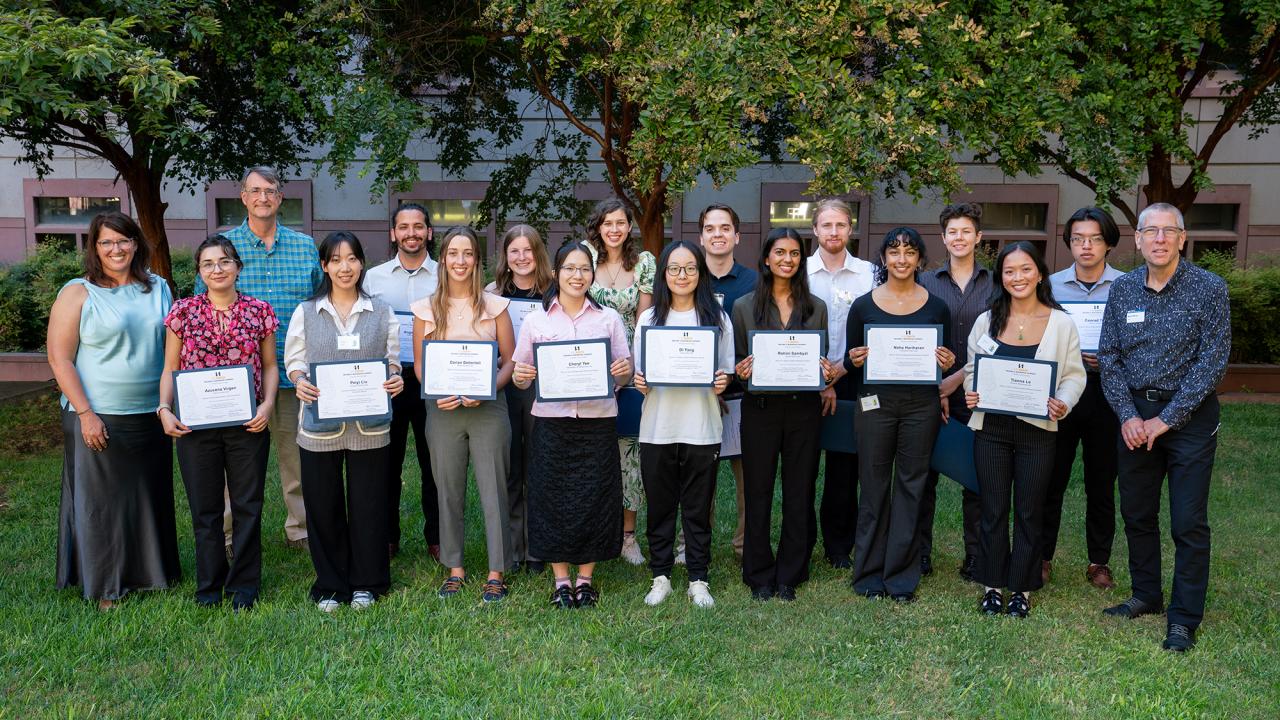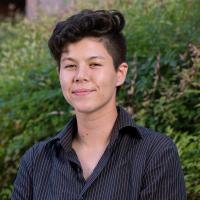
Donor-Supported Research Brings Experiential Learning to Summer Quarters
A portfolio of research awards keeps undergraduates from losing research experience over summer
Each year, the Dean’s Summer Undergraduate Research Program (SURP) helps provide vital support to students wishing to stay on campus —and in the lab — over the summer term.
Normally, undergraduates leave campus for the summer if they are not enrolled in classes. They often do this to work and save up funds for the start of the next academic year. SURP, which is comprised of several different donor-funded undergraduate research awards, allows students to continue their research projects over the summer when they might have otherwise lost several months on their research projects.
“The students’ research projects represent the breadth of excellence and expertise in the college,” said Mark Winey, dean of the College of Biological Sciences. “I am thrilled to know that each student’s academic journey has continued over the last three months, and have greatly enjoyed learning about their individual interests and research projects.”

This year’s cohort of SURP scholars began their projects earlier in the 2023-24 academic year. Over the summer, students in the program work directly with individual faculty on research projects and meet regularly with faculty and staff organizers of the program.
“It’s inspiring to support these outstanding cohorts of CBS undergraduates,” said Helen Frasier, assistant dean of student success initiatives. “Their work, which is always fascinating, makes the summer experience truly engaging for each student, as well as for those of us who work with them.”
Over the summer, SURP scholars meet with guest speakers from academia to industry, discuss their research experiences, and collaboratively develop their presentations for the research showcase. So, there’s plenty for Frasier and her colleague, Dave Furlow, a professor of neurobiology, physiology and behavior, to do.
Furlow, who was involved with SURP for the first time this year, worked with Frasier to coach, mentor and organize the student cohort. “I’ve really enjoyed working with this excellent group of students this summer, helping them get the most out of their exciting research projects representing the breadth of modern biology, and discussing potential, high-impact career paths ahead of them.”
SURP culminated in a research showcase on Monday, September 23, where students presented their research projects and findings to their peers, mentors and college leadership.
Meet the 2024 Cohort of SURP Students

Sydney Becker
Major: Biochemistry and Molecular Biology
Lab: Priya Shah, Microbiology and Molecular Genetics
Award: Dean’s Circle Undergraduate Research Award
Project: Elucidating Molecular Mechanism of Virus Replication and Microcephaly by Examining ANKLE2 Protein-Protein Interactions during Zika Virus Infection
This project explores how Zika virus (ZIKV) causes microcephaly by examining the interaction between ZIKV protein NS4A and host protein ANKLE2. Through proteomics, it aims to identify changes in ANKLE2’s protein-protein interactions during infection, ultimately illuminating ANKLE2’s role in ZIKV replication and the onset of microcephaly.

Darian Debortoli
Major: Cell Biology
Lab: Nitzan Shabek, Department of Plant Biology
Award: Khaira Family Experiential Learning Award
Project 1: Investigating Ubiquitin-Proteasome System in Chloroplasts to Identify Ubiquitin Interactors
This project examines the ubiquitin-proteasome system in chloroplasts, crucial for protein degradation. Understanding this process, which regulates photosynthesis and plant growth, aims to reveal new mechanisms of growth regulation.
Project 2: Crystallization and Structural Characterization of the U-box Domain in PUB 22
This research focuses on crystallizing and analyzing the PUB 22 U-box domain to understand its role in the ubiquitin-proteasome system. The study's findings could impact our knowledge of protein degradation, stress responses, and plant immunity, with potential applications in enhancing crop resilience.

Neha Hariharan
Major: Genetics and Genomics; Gender, Sexuality, Women's Studies
Lab: Alex Nord, Neurobiology, Physiology, and Behavior
Award: Dean’s Circle Undergraduate Research Award
Project: Investigating the Epigenetic Response to Morphine in the Ventral Tegmental Area Using a Mouse Model
This research examines the neurobiological mechanisms of Opioid Use Disorder (OUD), focusing on the Ventral Tegmental Area (VTA). Using mouse models, it identifies chromatin regions linked to histone modifications and analyzes gene associations and pathways to understand OUD's effects. The project enhances foundational wet lab and computational research skills.

Max Kelly
Major: Biological Sciences
Lab: Jonathan Eisen, Evolution and Ecology
Award: Stacey Roberts and Michael Lassner Award
Project: Exploring Pathogen Inhibition and Nutrient Cycling Within the Microbiome of Zostera marina: Developing Probiotic Treatments for Seagrass Conservation
This project investigates the microbiome of Zostera marina, focusing on the microbes’ ability to inhibit the growth of oomycete pathogen Labyrinthula zosterae, which currently contributes to the rapid spread of eelgrass wasting disease. Additionally, this research investigates the microbes’ nutrient cycling capabilities for elements like Nitrogen and Sulfur. The ultimate goal is to develop probiotic treatments to bolster seagrass populations.

Tianna Le
Major: Neurobiology, Physiology, and Behavior
Lab: Richard McKenney, Molecular and Cellular Biology
Award: Dean’s Circle Undergraduate Research Award
Project: Effects on Tau-Microtubule Interactions in Neurodegenerative Diseases
This research investigates Alzheimer's disease by studying tau, a protein that forms harmful aggregates in the brain. The project examines how tau's normal interaction with microtubules is disrupted by these aggregates, potentially altering cellular processes. Understanding this relationship could reveal new therapeutic targets for Alzheimer's and related disorders.

Peiyi (Nina) Liu
Major: Cell Biology
Lab: Chang-il Hwang, Microbiology and Molecular Genetics
Award: Charles and Nanci Cooper Undergraduate Research Award
Project: Investigation on BET Inhibition Enhancing Autophagic Flux and Autophagy-dependent Cell Death in Familial Pancreatic Cancer
This research focuses on familial pancreatic cancer (FPC), a subtype of pancreatic cancer characterized by mutations in DNA repair genes. By targeting pathways related to autophagy and DNA repair, the project investigates how BET inhibitors induce autophagy-dependent cell deaths within FPC cells, aiming to develop personalized treatments for FPC patients.

Angel Perez
Major: Biochemistry and Molecular Biology
Lab: Celina Juliano, Molecular and Cellular Biology
Award: John Cuppoletti and Danuta H. Malinowska Award in Biochemistry and Molecular Biology
Project: Investigating Cell Type Transdifferentiation During Hydra Regeneration
This project explores how Hydra vulgaris regenerates spumous mucous gland cells (sMGCs) through de novo differentiation from interstitial stem cells (iSCs) or transdifferentiation of zymogen gland cells (ZMGs). Using molecular techniques to track cellular markers, the research reveals mechanisms driving sMGC regeneration, enhancing knowledge of cell plasticity and tissue healing.

Ethan Perez
Major: Biological Sciences
Lab: Laura Bogar, Plant Biology
Award: Maud Wrightson Hinchee, Ph.D. Undergraduate Research Award
Project: Metabolic Bet-Hedging: Quantifying the Investment of Douglas Fir in Low-Quality Ectomycorrhizal Fungal Partners
This project investigates if plants benefit from maintaining low-quality mycorrhizal fungi under changing conditions. By planting Douglas fir seedlings with Suillus lakei and varying nitrogen levels, the study aims to quantify plant investment in these fungi, revealing if such investments help plants adapt to environmental changes.

Jedidiah Peek
Major: Biochemistry and Molecular Biology
Lab: Philipp Zerbe, Plant Biology
Award: Charles and Nanci Cooper Undergraduate Research Award
Project: Crystallization and Structural Characterization of Terpene Synthases
This research focuses on diterpenes, specifically understanding the structure-function relationships in terpene synthases. The project involves enzyme expression, purification, and crystallization, followed by site-directed mutagenesis to identify critical residues for catalysis and product specificity. The research aims to elucidate how plant metabolites are synthesized and their effects on organisms.

Rohini Sambyal
Major: Neurobiology, Physiology, and Behavior
Lab: David Olson, Chemistry
Award: Alumni to Aggie Student Research Award
Project: Investigating the Effects of DOI on the Brain's Medial Prefrontal Cortex and Somatosensory Cortex in Mice
This project investigates if the psychedelic DOI differentially affects the brain’s medial prefrontal cortex and somatosensory cortex in mice. By comparing hallucinogenic responses, it aims to contribute to the development of non-hallucinogenic treatments for depression. Additionally, the “Designer Receptors Exclusively Activated by Designer Drugs” techniques will be used to isolate more specific neuronal mechanisms involved in the hallucinogenic experience without using actual drugs.

Nadia Sparenberg
Major: Evolution, Ecology, and Biodiversity
Lab: John Stachowicz, Evolution and Ecology
Award: Dean’s Circle Undergraduate Research Award
Project: Investigating Talitrid Clustering Behavior and its Ecological Impact in Sandy Beach Ecosystems
This project examines wrack detritivores' talitrid clustering behavior across multiple sites and species. By combining fieldwork and mesocosm experiments, the study aims to determine if clustering is a plastic trait, explore its causes, and assess its effects on community composition. The work is conducted at Bodega Marine Laboratory.

Conrad Tang
Major: Human Biology
Lab: Johan Leveau, Plant Pathology
Award: Khaira Family Experiential Learning Award
Project: Identification of Bacterial IAA Sensing Protein through the Construction of Two-Component Hybrid Receptors
This project investigates the phyllosphere, or plant leaf surface, which hosts many microorganisms. Pseudomonas putida 1290 can make, use, and detect the plant growth hormone IAA. The Leveau Lab is studying how P. putida 1290 senses IAA by creating hybrid receptors, aiming to identify the specific receptors involved in IAA detection and movement.

Azucena (Zucy) Virgen
Major: Biological Sciences
Lab: Celina Juliano, Molecular and Cellular Biology
Award: Khaira Family Experiential Learning Award
Project: Characterizing Head Regeneration Gene Regulatory Network (rGRN) in Hydra vulgaris
This project focuses on characterizing the gene regulatory network involved in the regeneration of Hydra vulgaris. By understanding these mechanisms, Virgen aims to apply this knowledge to improve human injury outcomes. Her work involves identifying key genes and pathways that facilitate regeneration in this model organism.

Di Yang
Major: Biological Sciences
Lab: Xiaosa (Jack) Xu, Plant Biology
Award: Alumni to Aggie Student Research Award
Project: Investigating the Nuclear Moonlighting Role of RA3 and its Intranuclear Interaction with IDS1 in Maize Inflorescence Branching
This project examines the interaction between RAMOSA3 (RA3) and INDETERMINATE SPIKELET1 (IDS1) in maize ear inflorescence. Using CO-IP, the study aims to uncover RA3's nuclear functions in blocking inflorescence branching, which could enhance maize developmental biology and crop yield.

Cheryl Yee
Major: Biochemistry and Molecular Biology
Lab: Kassandra Ori‐McKenney, Molecular and Cellular Biology
Award: Roy H. Doi Undergraduate Research Award
Project: Investigating How Tau Influences Microtubule Dynamics in Neurodegenerative Diseases
This project examines tau's role in regulating microtubule dynamics in neurodegenerative diseases. By comparing how human and fruit fly tau affect microtubules in vitro, the research aims to gain molecular insights into disease progression. The project has honed the researcher's biochemistry skills and inspired a continued pursuit of a research career.
